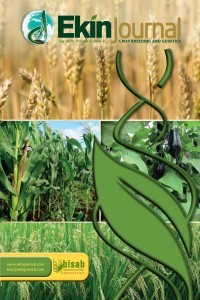Accelerated Pepper Breeding Using Molecular Markers and Doubled Haploidy Technique
Accelerated Pepper Breeding Using Molecular Markers and Doubled Haploidy Technique
Anther culture, Capsicum spp., Tsw gene, Hatay pepper, molecular marker,
___
- Abak K, Pochard E and Dumas De Vaulx R, (1982). Transmission of resistance to Phytophthora capsici on root and stems of pepper plants: Study of doubled haploid lines issued from the cross “PM 217 x Yolo Wonder” through anther culture. Capsicum Newsletter 1:62-63.
- Alremi F, Taşkın H, Sönmez K, Büyükalaca S and Ellialtıoğlu Ş, (2014). Biber (Capsicum annuum L.)’de genotip ve besin ortamının anter kültürüne etkileri. Türk Tarım ve Doğa Bilimleri Dergisi 1 (2): 108-116, https://doi.org/10.30910/turkjans.160702 (in Turkish).
- Anonymous, (2020). TÜİK kurumsal. https://data. tuik.gov.tr/Bulten/Index?p=Bitkisel-Uretim istatistikleri 2020 33737 (Erişim Tarihi: 23.02.2021)
- Atasoy D, Baktemur G and Taşkın H, (2021). Bazı biber (Capsicum annuum L.) genotiplerinin anter kültürü performanslarının belirlenmesi. Yüzüncü Yıl Üniversitesi Tarım Bilimleri Dergisi 31(2):282-293. (in Turkish)
- Bat H, Shidfar M, Çömlekçioğlu N and Ellialtıoğlu ŞŞ, (2020). In vitro androgenesis in pepper and the affecting factors on success: I. Carbon source and concentrations. Biotech Studies, 29(2):62-68.
- Çömlekçioğlu N and Ellialtıoğlu ŞŞ, (2018). Review on the research carried out on in vitro androgenesis of peppers (Capsicum annuum L.) in Turkey. Res. J. Biotechnol., 13(6):75-84.
- Doyle JJ and Doyle JL, (1987). A rapid DNA isolation procedure for small quantities of fresh leaf tissue. Phytochem Bulletin, 19:11-15.
- Dumas De Vaulx R, Pochard E and Chambonnet B, (1982). Distribution of TMVpo susceptible and resistant doubled haploid lines from anther culture of heterozygous L+ /L1 hybrids. Capsicum Newsletter 1:52-53.
- Ellialtıoğlu Ş, Kaplan F and Abak K, (2001). The effect of carrot extract and activated charcoal on the androgenesis of pepper. In Proceedings XIth EUCARPIA Meeting on Genetics and Breeding of Capsicum & Eggplant, (Vol.9, p.13), Antalya- Türkiye
- FAOSTAT, (2020). Crop Statistics http://www.fao. org/faostat/en/#data/QC/visualize. (Accessed 09.01.2020)
- German TL, Ullman DE and Moyer JW, (1992). Tospoviruses: Diagnosis. Molecular biology, phylogeny and vector relationships. Annu. Rev. Phytopathol. 30:335-348.
- Griep RA, Prins M, van Twisk C, Keller HJHG, Kerschbaumer RJ, Kormelink R, Goldbach RW and Schots A, (2000). Application of phage display in selecting tomato spotted wilt virusspecific single-chain antibodies (scFvs) for sensitive diagnosis in ELISA. Phytopathology, 90(2):183-190. doi:10.1094/phyto.2000.90.2.183
- Heberle-Bors E, (1985). In vitro haploid formation from pollen: A critical review. Theor. Appl. Genet. 71: 361-374.
- Keleş D, Pınar H, Ata A, Taşkın H, Yıldız S and Büyükalaca S, (2015). Effect of pepper types on obtaining spontaneous doubled haploid plants via anther culture. Hort Science, 50(11):1671-1676.
- Nar M, Albezirgan HN, Demirkaya B, Fidan H, Aktaş H and Ellialtıoğlu ŞŞ, (2022). Accelerated pepper breeding studies with MAS and androgenesis techniques. IV. International Plant Breeding Congress Plant Breeding for the Future: From Local to Global, Antalya Türkiye, 21-25 November 2022, Proceedings pp: 250-259.
- Öntürk G and Çürük S, (2019). Hatay’ın farklı ilçelerinde yetiştirilen biber köy popülasyonlarında bitki ve meyve özellikleri. Yüzüncü Yıl Üniversitesi Tarım Bilimleri Dergisi, 29 (4):689-701. doi: 10.29133/yyutbd. 639261. (in Turkish)
- Pochard E, Dumas De Vaulx R and Florent A, (1983). Linkage between partial resistance to CMV and susceptibility to TMV in the line “Perennial”. Capsicum Newsletter 2:34-35.
- Sönmez K, Ellialtıoğlu ŞŞ and Oğuz A, (2015). Yerel sofralık domates gen kaynaklarının değerlendirilmesinde tartılı derecelendirme yönteminin kullanımı. Tarım Bilimleri Araştırma Dergisi (TABAD), 8(1):14-19. (in Turkish)
- Şevik M, (2014). Domates lekeli solgunluk virüsü (TSWV)’nün tarımsal ürünlerde meydana getirdiği ekonomik kayıplar. Harran Tarım ve Gıda Bilimleri Dergisi, 15(1):35-42.
- https://dergipark.org.tr/en/pub/ harranziraat/ issue/18434/194124. (in Turkish)
- UPOV (2021). https://www.upov.int/ (Accessed: 21.12.2022). Vagera J, (1990). Pepper (Capsicum spp.): In Vitro induction of haploids. In: Biotechnology in agriculture and forestry, Vol:12, Haploids in Crop Improvement I (ed. by Y.P.S. Bajaj), Springer- Verlag Berlin Heidelberg, pp 374-392.
- Vural G, Arı E, Zengin S and Ellialtıoğlu ŞŞ, (2019). Development of androgenesis studies on eggplant (Solanum melongena L.) in Türkiye from past to present. In book: Sustainable Crop Production (Ed: Dr. Mirza Hasanuzzaman) ISBN 978-1-78985- 318-6 doi: 10.5772/intechopen.88299. pp: 1-27.
- ISSN: 2149-1275
- Yayın Aralığı: Yılda 2 Sayı
- Başlangıç: 2015
- Yayıncı: Bitki Islahçıları Alt Birliği
Esra CEBECİ, H. Filiz BOYACI, Yıldız DOĞAN, Laura TOPPINO, Giuseppe L. ROTINO
Registration of “Bossa 159” Cotton (Gossypium hirsutum L.) Variety
Mukesh KUMAR, Sushil SHARMA, Manoj KUMAR, Amarjeet NIBHORIA, Bijender Singh YADAV
Registration of “Sinanbey” Winter Feed Barley (Hordeum vulgare L.) Variety
Namuk ERGÜN, Sinan AYDOĞAN, İsmail SAYİM, Melih BİLİR, Emre KARAHAN, Gülden Çetin ÖZKAN
Renu MUNJAL, Jogender BENIWAL, Arjoo DHUNDWAL, Alisha GOYAL, Anita KUMARI, Rishi K. BEHL
Registration of “Sayım 40” Winter Barley (Hordeum vulgare L.) Variety
Namuk ERGÜN, İsmail SAYİM, Sinan AYDOĞAN, Melih BİLİR, Emre KARAHAN, Gülden Çetin ÖZKAN
Parul RANA, Om P. BISHNOI, Harsh CHAURASIA, Rishi K. BEHL
Registration of "Samsoy" Soybean [Glycine max (L.) Merr.] Variety
Mehmet ERDOĞMUŞ, Meral ERGİN, Serkan YILMAZ, Seyit Ahmet EROL, Celal BAYRAM
Registration of “Fener” Eggplant (Solanum melongena L.) Variety
Ayşe KAHRAMAN, Mehmet Asım HAYTAOĞLU, Sevgi MUTLU, Seyfullah BİNBİR
Accelerated Pepper Breeding Using Molecular Markers and Doubled Haploidy Technique
Mesut NAR, Hande Nur ALBEZİRGAN1, Burcu D EMİRKAYA, Hakan FİDAN, Hakan AKTAŞ, Ş. Şebnem ELLİALTIOĞLU
